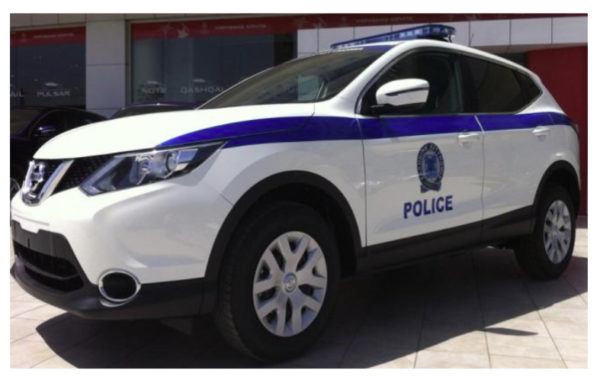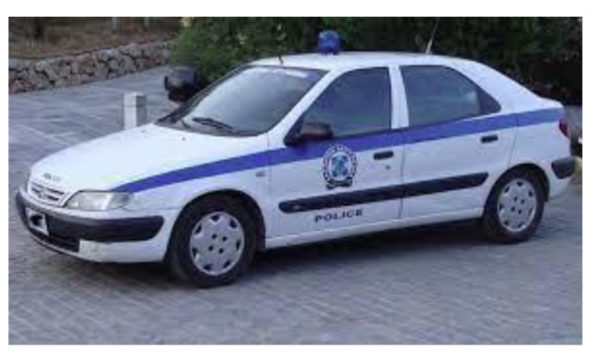This testimony recounts a violent pushback from the Greek village of Lagyna to Turkey near the village of Adasarhanli. The respondent, a 31-year-old man from Morocco, was part of the pushback group. This was his 7th pushback – six being from Greece to Turkey and one from Bulgaria to Turkey.
On 26th March, the respondent, together with four other men from Morocco, aged between 21 and 31 years old, crossed the Greek/Turkish border near the Turkish town of Karaağaç. After crossing the border the group walked for six days through mountains and agricultural fields. On the 7th day of their journey, 01/04/2022, the group ran out of food and decided to buy some food in the Greek village of Kirki. During the interview, the respondent remembers Kirkas Tavern as a key location in the village. Not being able to find food, the group left the village and planned to continued on.
At 1 p.m., as the group was leaving the village, two men wearing blue uniforms in a white Nissan Qashqai stopped next to them, recalled the respondent. He recalled the car had a blue stripe, a logo, and “police” written on the side of it. The car, according to the respondent, was the same as shown in Image 1.

When the car stopped, the respondent and the group started running away from the two men, “They were running behind us until we got into a closed alley where they shot in the air and aimed their guns at us.”
The two men in blue uniforms started talking in Greek and in English, asking the respondent, “Where are you from?” The respondent replied and told them “We want to claim asylum in Greece. The man in a blue uniform said ‘ok’ and asked us to sit.”
Then, a white Skoda with a blue stripe and “police” written on the side arrived at the scene (identified by the respondent as similar to image 2). The respondent said that both cars present at the apprehension point shared the same logo. The two men that drove the second car wore the same uniform as the two men that stopped them in the beginning, explained the respondent.

The group was separated and loaded into the two cars and were driven for about forty minutes. The respondent was able to see outside and recalled that they were driving near the sea. They eventually entered a small alley. In this alley, the respondent recalled seeing three white motorcycles and two white pickup trucks with “police” written on it.
According to the respondent, the transit group were then taken out of the cars and escorted into a yellow building. This building, as described by the respondent, was in an alley and at the end of this alley he saw restaurants. In front of the building he saw a flag resembling the Greek flag. This description matches the Alexandropolis police station.
Once inside, the group was brought to a small room, at which point the four men in blue uniforms who had brought them to the detention site, left. The officers inside the building were wearing sage green pants and olive green shirts with police written in yellow on them.
It was around 3 p.m. when three men in green uniforms searched the group; they told them to give up their phones and empty their pockets. The men in green uniforms also asked the group questions in English. The respondent said, “sometimes they slapped one of us and they kept on saying the word ‘’Malaka [Greek word for ‘asshole’]’’.
The respondent said that the group was not registered in this building and they also didn’t sign any documents. They were also not given food or water. After around thirty minutes, the group was escorted to a white Ford Van that brought them to another location. The group was in the back of the car and the respondent recalled that they could not see outside.
At 3.30 p.m. the group arrived at a detention site.
The respondent described that the area was surrounded by a one-meter high fence with barbed wire on the top, was full of trees, and had two roads; one paved and one unpaved, approximately 50 meters from the entrance of the detention site. The building was white and had a flag resembling the Greek flag on top of it. Inside the area there were many “old tires and trails”.
Inside the detention site, seven men wearing sage green jackets and pants were present. Their uniforms, according to the respondent, had “police” written on their shoulders.
“When we arrived they took us inside a big room. In the hallway they asked us to undress completely and started searching every part of our clothes”. Before they gave back their clothes, the respondent said “they started beating us and kicking us and then punching us and hitting us with a plastic baton”.
After approximately 15 minutes, the group was brought to a cell. He described the cell as follows:
“The cell was like a garage and it was in the back of the detention site.” The cell was made of bricks and a fence covering it. The cell was around seven by eight meters and surrounded by a fence. The ground of the cell was from soil ground. Inside the cell, there were two metal bunk beds and a dirty toilet with a bad smell. The roof had red brick-like an old farm.”
The respondent said that when they arrived “there were around sixty other people” but every hour they brought 15 to 20 more people. After five hours, there were more than 170 people in the cell. The respondent described that men, women, and minors from Afghanistan, Syria, Morocco, Algeria, and Turkey between the age of 10 and 55 years were detained with him. There were five women and 22 minors, of which 20 were unaccompanied minors.
The respondent was kept in this detention site for about five hours. At this point he was not given water or food, his documents were not checked, and there was no interpreter nor were his his fingerprints or photo taken.
At 9 p.m., approximately five hours after the respondent was brought to the detention site, men wearing civilian clothes and balaclavas, as well as men wearing blue uniforms, took the people from the detention site and loaded them into white vans. Moreover, he identified four unmarked cars at the detention site: one red Mercedes van, two white Mercedes vans, and one white Ford van.
The respondent recalled that he was with around 40 other people in the van. The drive, as described by the respondent, was fast and reckless and took around 10 minutes. Once outside of the van, the respondent saw that they stopped in an agricultural field and in the background he saw the lights of a city. There was also another white van. In front of him he saw a small forest. This forest, as he later described, was in front of a river.
The respondent recounted that there were around 80 people at the pushback site when they arrived. The respondent stated that there were people from Syria, Afghanistan, Morocco, Algeria, and Turkey aged between 10 and 55 years old. There were five women and around 20 minors.
At the pushback site, there were twelve men the respondent described as perpetuating the pushback. The respondent further explained that all the men spoke Greek to each other. According to the respondent, six of them were wearing civilian clothes and balaclavas, four were wearing the same blue uniform as the ones in the detention site, two were wearing black uniforms with no insignia, logo or flag, and wore black balaclavas and carried large firearms.
The six men in civilian clothes spoke Arabic and Kurdish, but the respondent could not recall what dialect it was. They told the group not to make any sounds and to get into group of eight. They then told the group that once they are in Turkey they should run, recalled the respondent. At the push back location, the group was searched again, and were asked if they had money. The women were also reportedly searched, despite no female officer being present at the scene.
The respondent then described the violence they experienced just before being pushed back: the group was hit with tree branches, and one man with a black uniform and balaclava was kicking everyone while the another uniformed man kept pointing his firearm at the transit group.
The respondent then recalled that they started loading everyone onto a boat in groups of eight, about 1.5 hour after the group had arrived at the pushback location. The respondent was in the last group that was called to the river. At the river, he recalled seeing one of the men in a blue uniform wearing goggles, and holding a green screen that he pointed towards the Turkish side of the border.
The respondent then described the boat at the river: it was a rubber boat around two to three meters, and the inside was white while the outside was grey with a white stripe. There were eight people on the boat the respondent was pushed back on were pushed back. The boat was driven (paddled) by two men wearing civilian clothes, recalled the respondent, “On the boat they told us “don’t come back to Greece or you will die trying”. When they arrived in the middle of the river the pushback group had to jump in the river. At first, the water came to the respondent’s chest but closer to Turkey the river was deeper and the group had to swim.
It was around 11 p.m. when the respondent crossed the river and started looking for his friends. Once he found them, they started running away from the border, and after two hours, they arrived in Adasarhanli, a Turkish town along the Meric river. Eventually, in the town of Meric, they took a taxi to Edirne that was paid for by their friends.
